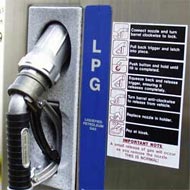The government is close to taking a decision on capping the number of subsidised LPG cylinders to "econonomically not weaker" sections to bring down the subsidies by up to Rs 10,000 crore annually, Minister of State for Petroleum and Natural Gas R P N Singh said today.
The government is also looking at partial decontrol of diesel, he said.
Singh said the government gives Rs 36,000 crore in subsidy on LPG and a lot of people who are "not economically weaker sections" and don't require them, take benefit, adding, the government is looking at reducing the subsidy on LPG by capping the amount (number) of cylinders given on subsidy.
Stating that the government is in an adavanced stage of taking a decision on reducing LPG subsidies, he told reporters on the sidelines of a function: "If we cap some cylinders, which do not infringe on the right of poor people who get subsidies, I think we can save Rs 8,000 crore to Rs 10,000 crore just by capping the cylinders for the rich (restricting the number of subsidised cylinders for economically not weaker sections).
But he sounded cautious on the issue of raising prices of diesel, saying its a very delicate issue.
"If you try to raise the prices of diesel, it has a cascading effect on the economy. We are trying to work out a solution where it impacts the economy in the least manner but also brings down the fiscal deficit", Singh said.
Singh said the government gives Rs 36,000 crore in subsidy on LPG and a lot of people who are "not economically weaker sections" and don't require them, take benefit, adding, the government is looking at reducing the subsidy on LPG by capping the amount (number) of cylinders given on subsidy.
Stating that the government is in an adavanced stage of taking a decision on reducing LPG subsidies, he told reporters on the sidelines of a function: "If we cap some cylinders, which do not infringe on the right of poor people who get subsidies, I think we can save Rs 8,000 crore to Rs 10,000 crore just by capping the cylinders for the rich (restricting the number of subsidised cylinders for economically not weaker sections).
But he sounded cautious on the issue of raising prices of diesel, saying its a very delicate issue.
"If you try to raise the prices of diesel, it has a cascading effect on the economy. We are trying to work out a solution where it impacts the economy in the least manner but also brings down the fiscal deficit", Singh said.
The Minister, who earlier inaugurated the 17th refinery technology meet jointly organised by Centre for High Technology and Hindustan Petroleum Corporation Ltd, ruled out absolute decontrol of diesel in the near term.
"It's extremely difficult for us to absolutely decontrol diesel at the moment because it would impact the economy in a very, very serious manner," he said, but added that the government is looking at partial decontrol of diesel so that the impact on the people would be of "reduced magnitude".
He recalled that diesel was decontrolled in 2010 but the measure has not been implemented as the price of crude oil started rising.
Singh said the state-run oil marketing companies are bleeding and are having a "terrible time" because of the subsidy burden. The government wants to bring down the subsidies on kerosene, LPG and diesel in a way that does not impact the people in a major manner and takes away subsidies from people who do not deserve them.
On prices of petrol, the Minister said his personal opinion is that it should be like in the US, where petrol prices change every day, and different companies have different prices.
"It's extremely difficult for us to absolutely decontrol diesel at the moment because it would impact the economy in a very, very serious manner," he said, but added that the government is looking at partial decontrol of diesel so that the impact on the people would be of "reduced magnitude".
He recalled that diesel was decontrolled in 2010 but the measure has not been implemented as the price of crude oil started rising.
Singh said the state-run oil marketing companies are bleeding and are having a "terrible time" because of the subsidy burden. The government wants to bring down the subsidies on kerosene, LPG and diesel in a way that does not impact the people in a major manner and takes away subsidies from people who do not deserve them.
On prices of petrol, the Minister said his personal opinion is that it should be like in the US, where petrol prices change every day, and different companies have different prices.




